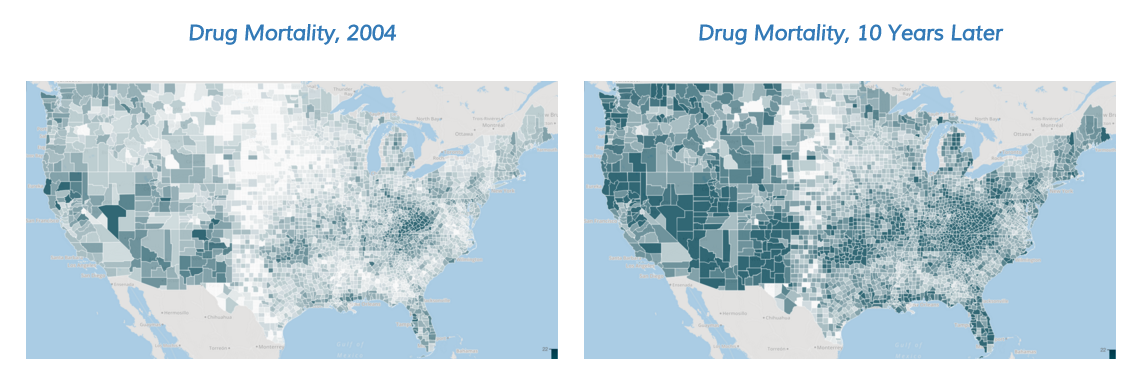Connecting state and local government leaders
24 city and county officials from across the country met to address the local impacts of the nation’s growing substance abuse crisis.
WASHINGTON — City and county government leaders gathered in the nation’s capital last week for the first convening of the new National City-County Task Force on the Opioid Epidemic.
The task force, jointly run by the National Association of Counties and National League of Cities, is comprised of 24 local officials from across the country who bring various and relevant experience to the table, including Leticia Perez, a Kern County, California, supervisor and former public defender; Leta Mach, an educator turned city council member in Greenbelt, Maryland; Vidya Kora, a LaPorte County, Indiana, commissioner and practicing physician; and Joel Navarro, a Tempe, Arizona, city council member and first responder.
In short, the task force officials are on the front lines of the nation’s opioid crisis.
“While Congress debates the issue, we see it in our emergency rooms, in our police stations, in our own families,” Little Rock Mayor Mark Stodola said at Thursday’s gathering. The mayor emphasized that, while funding at the national level will be important in tackling the crisis, the initiatives that make the biggest difference will likely need to be implemented at a local level.

During official introductions, the task force members told the stories of how the opioid epidemic has touched their communities.
Stodola cited the fact that Arkansas is in the top 10 states in the nation in terms of number of painkiller prescriptions written. There are 19 painkiller prescriptions for every one resident in Mercer County, West Virginia, said Greg Puckett, who serves as a county commissioner there.
If the rate of deaths attributed to opioid abuse continues to increase in Erie County, New York, as it has for the last several years, its communities will see 500 deaths this year alone, said County Executive Mark Poloncarz, whose jurisdiction includes Buffalo.
The meeting was divided into three thematic sections: prevention, treatment and public safety. But it was with data that the day opened.
Representatives from Seattle-based cloud software company Socrata presented national- and state-level data, along with an interactive website created so that task force members could access information on their communities and others.

Many of the task force members expressed some frustration with the data coming out of national studies, claiming that they are at once out of date—the most recent reporting for many of the stats are from 2014—and inaccurate.
County officials also spoke of the somewhat open secret that localities have the tendency to underreport their opioid data.
“A lot of the communities are afraid to have their data be up to date,” said Nick Willard, police chief for the city of Manchester, New Hampshire, speaking to the worry that grim statistics may hurt economic development efforts.
During the discussion on prevention, which was facilitated by Robert Morrison, the executive director of the National Association of State Alcohol and Drug Abuse Directors, the resounding chorus seemed to be that prevention efforts are not only necessary, but they also make sense economically. Every $1 spent on prevention saves up to $25 long term, according to one figure given by Poloncarz.
Morrison urged those on the task force to keep in mind that money or efforts put toward prevention won’t go to waste, adding “we’re going to see another epidemic of another drug of another type, right now it’s heroin, but there will be something else.” Any infrastructure or practices that are put in place now, will also help prevent future crises.
The primary focus of the discussion on treatment was on medication-assisted treatment strategies that rely on the use of substances like methadone or buprenorphine.
Melinda Campopiano, a medical officer for the Center for Substance Abuse Treatment, who led the discussion, urged the task force to remember that medication-assisted treatment strategies have been proven to work.
Methadone treatment has been around for about 45 years, and during that time studies of its effectiveness have shown that it can help cut the risk of mortality and HIV / AIDS infection by up to 50 percent. Campopiano concluded that it is “really hard to rationalize a different intervention.”
Much of the discussion that followed instead focused not on the efficacy of these treatments but on the barriers local officials face when they try to make these options available to those who need them.
Task force members emphasized that many of their citizens express a pervasive not-in-my-backyard sentiment toward the location of methadone clinics. Caps on medication-assisted treatment programs that cause long wait lists, as well as regulatory limits on the number of individual prescriptions doctors can write for methadone, were also topics of discussion.
While it was widely acknowledged among the task force members that this crisis isn’t one the country can arrest its way out of, there remained an eagerness to discuss the role law enforcement may play in the public safety angle of the epidemic. Willard led a conversation, along with Perez.
Willard shared the innovative strategies he has instituted in his own department, including analytics-based policing and quality-of-life investigations. While these strategies have reduced the crime rate in Manchester significantly, they have had little impact on overall drug use and the rate of overdoses in New Hampshire’s largest city.
“I have never been more discouraged in my history as a cop,” Willard said, regarding the lack of change in the number of drug-related fatalities.
Quinn Libson writes for Government Executive’s Route Fifty.

NEXT STORY: N.J.’s Richest Resident Leaves; How Many Denver Pot Shops Is Too Many?




